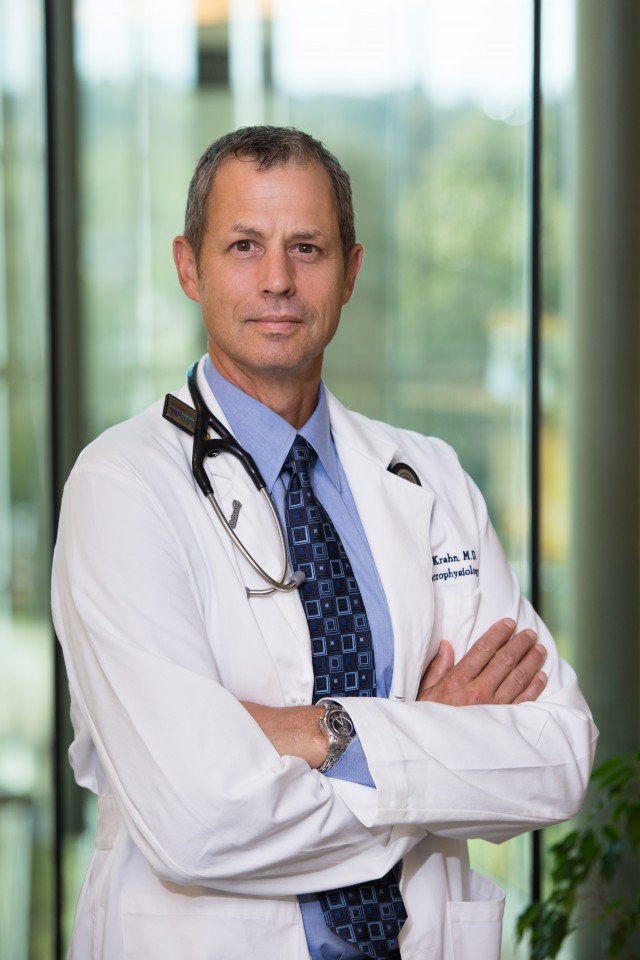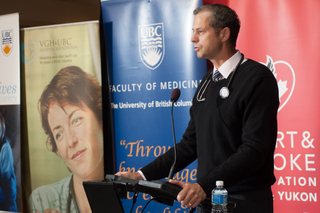British Columbia’s health community today welcomed the appointment of Dr. Andrew Krahn as the Sauder Family and Heart and Stroke Foundation Chair in Cardiology, and the Paul Brunes UBC Professor in Heart Rhythm Disorders.
Supported by $5.5 million from the Heart and Stroke Foundation, the Sauder family, the Brunes family, the VGH & UBC Hospital Foundation, Cardiac Services BC, Providence Health Care and the University of British Columbia, Dr. Krahn becomes the new Head of the Division of Cardiology in the UBC Faculty of Medicine, as well as Head of the Vancouver General Hospital Pacemaker Clinic.
Dr. Krahn’s responsibilities for building research and teaching capacity in cardiology will extend across the entire province. In addition, he will treat patients — mainly through the implantation of heart rhythm devices — and pursue his own research into inherited arrhythmias. His clinical duties, research, and leadership role will converge in the creation of a province-wide network of clinics to diagnose and treat people with that condition – estimated to number about 7,000 in B.C.
The Chair and Professorship was announced today by Dr. Howard Feldman, the executive associate dean, research, of the UBC Faculty of Medicine; Dr. Grady Meneilly, professor and head of the Department of Medicine; David Babiuk, provincial executive director, Cardiac Services BC; Diego Marchese, the chief executive officer, BC & Yukon, of the Heart and Stroke Foundation; and Per Brunes.
“We are grateful to the province and the many individuals and organizations who contributed to this chair and professorship, whose support will provide cardiology training and research with a dynamic, imaginative and determined leader,” Dr. Feldman said. “Heart and lung health is one of the research priorities of the Faculty of Medicine, and with this appointment, we reaffirm that commitment.”
Dr. Krahn, who grew up in B.C., was recruited back to the province from the University of Western Ontario. He is an internationally recognized expert in the management of cardiac arrhythmias, the genetic causes of arrhythmias, causes of loss of consciousness and implantable heart rhythm devices. He has published 245 papers in peer-reviewed journals, and is the president of the Canadian Heart Rhythm Society.
In Ontario, Dr. Krahn undertook a national study funded by the Heart and Stroke Foundation that detected rare genetic conditions in children and adults who have experienced a sudden cardiac arrest, as well as their family members, who may appear perfectly healthy. Once a genetic condition is identified, a potentially fatal cardiac arrest can be prevented through medication (typically beta-blockers) or implantable defibrillators.
Now Dr. Krahn is working to create a similar, province-wide network that would refer individuals with inherited arrhythmia – and their relatives – to a clinic at St. Paul’s Hospital or Royal Jubilee Hospital in Victoria, or use telemedicine technologies to provide remote examinations and counseling. The organizers expect that for every individual who has been identified due to an event (such as loss of consciousness), four more at-risk family members will be detected.
“I am honoured to join the B.C. cardiovascular health care team, and eager to provide direction for the superb collection of physicians, nurses and other specialists who are helping heart patients live longer and better lives,” Dr. Krahn said. “Besides seeing patients at both Vancouver General and St. Paul’s Hospitals, I am keen to promote discovery, innovation and the use of that knowledge to advance our understanding of heart disease, and to deliver better care in a lifelong learning environment.”
The Sauder Family and Heart and Stroke Foundation Chair in Cardiology was established at UBC in 1991, with an initial capital investment of $3.17 million from the Sauder family, the foundation, and the Faculty of Medicine. The chairholder is expected to expand his or her research while also taking a leadership role over other cardiology research in B.C.
“We’re very excited about the appointment of Dr. Krahn as the new Sauder Family and Heart and Stroke Foundation Chair in Cardiology. Investing in the very best research, led by international experts like Dr. Krahn, has the biggest impact on fast-tracking discoveries into life-saving programs, treatments and preventions – leading to longer, fuller lives for all Canadians,” said Diego Marchese, chief executive officer, BC & Yukon, of the Heart and Stroke Foundation.
The Paul Brunes Professorship was established by the Brunes family after his death at age 31. Starting in his teens, Paul had several times complained of a racing heartbeat, was examined several times at emergency departments and cardiologists, and underwent tests, but was not diagnosed with a heart ailment. He died suddenly in 2010.
“Our partnership with VGH & UBC Hospital Foundation enabled us to fundraise for this incredible professorship which we were able to name after our son, Paul Brunes,” said his father, Per. “We feel that his shortened life will have not been in vain and truly believe that the work of Dr. Andrew Krahn will help save young men and women like Paul from this devious kind of heart disease.”
The Paul Brunes Professor, supported by $1.6 million from the VGH & UBC Hospital Foundation, and $750,000 from Cardiac Services BC, is expected to take a leadership role in electrophysiology research and training to improve treatment of tachycardia (excessive heart rate), fibrillation (uncoordinated contraction of the heart muscles) or sudden cardiac death.
“We are delighted that UBC has recruited Dr. Krahn,” said David Babiuk, provincial executive director, Cardiac Services BC, an agency of the Provincial Health Services Authority. “His vast experience, skills, vision and leadership will be critically important to Cardiac Services BC as we continue our efforts in planning, assessing and improving the quality and access to cardiovascular care in British Columbia.”

